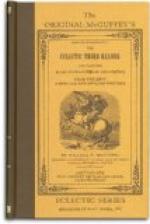From the essayists there was Lamb’s “Eulogy on Candle Light;” that delightful “Eulogy on Debt” from an unknown author; Addison’s “Allegory on Discontent,” and “Westminster Abbey;” and Jane Taylor’s “Discontented Pendulum.” Only seven selections were taken from the Bible; but one of these was Paul’s Defense before Agrippa. There were, however, quite a number of articles of strongly religious tendency, like Dr. Spring’s “Observance of the Sabbath.”
The book contained two hundred and thirty-five selections and of this number nearly one-half appeared in all subsequent revisions.
This Rhetorical Guide or Fifth Reader is the book that by its careful selection of specimens of the best English literature in prose and verse contributed most to the training of its readers toward the appreciation of true beauty in literature. It contained many pieces of solid and continuous worth,—many that relate closely to the great historical eras of the United States.
[McGuffey’s Ancestry]
In the latest revision of the highest reader, made in 1879, one hundred and thirty-eight selections composed the book. Of this number sixty-one were in the original book as prepared by Mr. A.H. McGuffey.
It was an admirable collection of much material that is still prized and which, when carefully read by pupils hungry for thoughtful language, made a deep and lasting impression. In many cases the inmost thought of the author may not have been at once fully apprehended by the young readers; but with advancing years and wider experience in life the stored words became instinct with thought and feeling.
THE AUTHORS.
Dr. William Holmes McGuffey was born September 28, 1800, on the southern border of Washington county, Pa. The family descended from William and Anna (McKittrick) McGuffey who came from Scotland, and landed at Philadelphia. They made a home in the southern part of York county, at which, during the Revolution, General Washington often stopped to refresh himself. In 1789 this family removed to Washington county, Pa.
[The Indian Scouts]
Alexander McGuffey, the father of Dr. McGuffey, was six years old when the family came to America in August, 1774. In 1790, when he was twenty-two years of age, he and his friend, Duncan McArthur, afterward a governor of Ohio, were selected from five young men who volunteered to act as scouts against the Indians in Ohio who were then threatening the frontier settlements in the western part of Virginia and Pennsylvania. These two young men were selected after tests by Samuel Brady to find which could run the fastest, shoot most accurately, and were least afraid of Indians. Alexander McGuffey served in the army three years, venturing his life with small bodies of scouts in the Indian country. He took part in several fights with the Indians. When General St. Clair in 1792 marched north from Cincinnati to meet the Indians,




